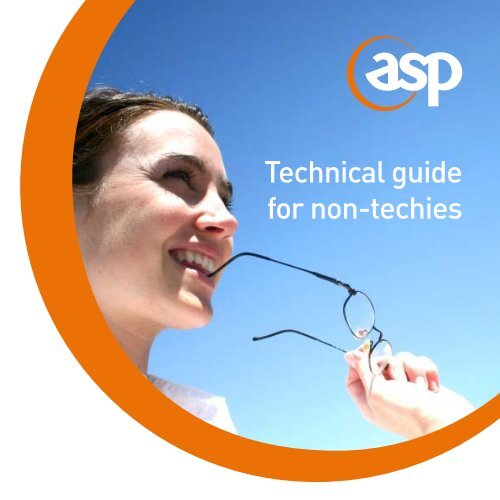Technical guide for non-techies - International Confex
Technical guide for non-techies - International Confex
Technical guide for non-techies - International Confex
Create successful ePaper yourself
Turn your PDF publications into a flip-book with our unique Google optimized e-Paper software.
<strong>Technical</strong> <strong>guide</strong><br />
<strong>for</strong> <strong>non</strong>-<strong>techies</strong><br />
© 2008 ASP MULTIMEDIA LTD
With new technology comes a<br />
whole raft of new buzzwords,<br />
TLA’s and terms, but what do they<br />
mean? We’ve put together some<br />
definitions and examples of the<br />
more commonly used terms - let us<br />
know if there are any missing or you’d<br />
like more in<strong>for</strong>mation on a particular area.<br />
What are cookies?<br />
Cookies are very small files that browsers store on your computer during usage.<br />
They are a normal part of internet usage and can make the Internet easier<br />
and quicker to use. Cookies let the website company recognise the computer<br />
and there<strong>for</strong>e react with previously gathered in<strong>for</strong>mation. For example when<br />
Amazon greets you by name and recommends you products – that is possible<br />
because of cookies.<br />
Some people delete cookies as they can be used to show what websites a<br />
person has been accessing. Cookies can also be used across multiple websites<br />
to detect usage, typically via banner advertisement companies.<br />
© 2008 ASP MULTIMEDIA LTD
What are spiders?<br />
Spiders, or Search Bots as they are also known,<br />
are automated views of your websites by the<br />
search engines to capture your page content<br />
and create the databases which people search<br />
on.<br />
Normally you do not need to know about them but<br />
what you do need to know is that, unchecked, they could<br />
appear to be multiple users looking at multiple pages on<br />
the web. There<strong>for</strong>e ASP, and most website usage analysis companies,<br />
remove the false statistics from the final reported figures. This does mean<br />
that sometimes figures drop slightly as we discover another new ‘spider’.<br />
What are metatags?<br />
Metatags are hidden from view on web pages but they hold in<strong>for</strong>mation <strong>for</strong> the<br />
web browser which displays the page. Most importantly <strong>for</strong> you are the metatags<br />
designed <strong>for</strong> the search engines where page keywords and descriptions are<br />
created. However, over time these are becoming less important.<br />
© 2008 ASP MULTIMEDIA LTD
What is Web 2.0?<br />
A buzzword that generally describes the move<br />
towards more user generated content and/<br />
or community building. Exhibitors uploading<br />
in<strong>for</strong>mation about their company is an example of<br />
user generated content. Note: web 2.0 strategies<br />
do not work <strong>for</strong> every website.<br />
What are white lists?<br />
Lists of approved email senders <strong>for</strong> particular companies. ASP is whitelisted by<br />
a couple of professional whitelisting databases. Generally, being whitelisted<br />
means your emails are less likely to be marked as spam.<br />
What are blacklists?<br />
The opposite of white lists! If you broadcast spam emails and enough people<br />
complain, then you could be blacklisted. ASP does all it can to ensure this does<br />
not happen but un<strong>for</strong>tunately we have no control over imported email lists<br />
– are they from a trusted opted-in source? Currently we are not blacklisted<br />
anywhere.<br />
© 2008 ASP MULTIMEDIA LTD
What is SEO? What does it mean to me?<br />
SEO stands <strong>for</strong> Search Engine Optimisation.<br />
It means giving your website lots of relevant<br />
content which the search engines can find and<br />
read. SEO is cheaper and more effective than<br />
Search Engine Marketing (SEM) but takes a good<br />
supplier and work to gather all the content together.<br />
SEO is not instant – changes in content take time to<br />
be picked up by search engines so it could take up to 6<br />
weeks to notice a difference in traffic.<br />
What is SEM? How can I use it?<br />
SEM stands <strong>for</strong> Search Engine Marketing. These are the little adverts you see<br />
when searching Google or other search engines. To have an advert display, you<br />
are actually bidding <strong>for</strong> the position and the more you are willing to pay, the<br />
higher you appear. You only pay though if people click on your advert (known<br />
as Pay Per Click or PPC). SEM is different from SEO as you can target areas<br />
which your website does not cover. For example, exhibitors could advertise<br />
themselves under your show name – this is entirely legal, so you should<br />
consider where you advertise your show <strong>for</strong> your audience…<br />
SEM is also instant which means you could use it when your website is new<br />
and not appearing in the search engines.<br />
© 2008 ASP MULTIMEDIA LTD
What is affiliate marketing?<br />
Affiliate marketing is similar to banner<br />
advertising but instead of paying per click you<br />
pay per action. For example, you could pay<br />
someone to advertise your show and pay them<br />
<strong>for</strong> everyone that clicks through and registers.<br />
Sounds difficult but it’s easy to track with campaign<br />
trackers and trace to source modules.<br />
What are junk mail filters and how do they work?<br />
They don’t always work is the first thing you need to know! Innocent email can<br />
be marked as spam and emails <strong>for</strong> replica watches could fly into your inbox!<br />
They work in multiple ways but in essence they are looking to see if your email<br />
looks like or sounds like spam. They also check to see who is sending it and<br />
to see if they are whitelisted (ASP is).<br />
What’s Google’s secret - how does it work?<br />
Did you know...68% of UK searches are through Google? Google’s secret, in our<br />
opinion, is that it’s very simple to use and their databases are extremely good.<br />
© 2008 ASP MULTIMEDIA LTD
Google sends out ‘spiders’ to find in<strong>for</strong>mation<br />
on the Web which is then databased. Google<br />
allows people to search the databases and<br />
return results which link to the original page<br />
on the Internet. It also helps that Google<br />
have masses of affiliate and third party search<br />
programmes which promote the service even<br />
more.<br />
What are virtual exhibitions?<br />
It’s like a website <strong>for</strong> an exhibition which doesn’t physically exist! The exhibitors<br />
upload content and visitors to the website search <strong>for</strong> it. Some virtual exhibitions<br />
try and look like a physical exhibition but we think they are missing the point<br />
- visitors want in<strong>for</strong>mation not pictures of a <strong>non</strong>-existent exhibition. Virtual<br />
exhibitions can be used to:<br />
• launch events – use the Web to test the water and build your brand<br />
• use the Web with an existing event to develop the brand and a community<br />
all year round<br />
• cancelling an event with an established<br />
brand? Try it online instead<br />
© 2008 ASP MULTIMEDIA LTD
What is meant by user generated<br />
content?<br />
Content that is updated by someone that doesn’t<br />
own the website. For example, exhibitors<br />
uploading in<strong>for</strong>mation about their products to<br />
an exhibition website. YouTube is an example of a<br />
website built <strong>for</strong> UGC.<br />
What are online communities?<br />
Not a replacement <strong>for</strong> a beer with a friend! In essence, where people return<br />
regularly to a place online to view news, in<strong>for</strong>mation, buy goods, play games etc<br />
and have the facility to talk or contact someone, that is an online community.<br />
Large <strong>for</strong>ums, BBC.co.uk, Second Life and games such as Everquest II are very<br />
different types of communities.<br />
© 2008 ASP MULTIMEDIA LTD
What are social networks?<br />
Sites specifically built <strong>for</strong> meeting other people<br />
and/or networking. LinkedIn is a business<br />
example with MySpace or Facebook used <strong>for</strong><br />
more casual networking.<br />
What are portals?<br />
A portal is a website which people use a lot to find relevant in<strong>for</strong>mation<br />
on the web. Google could be described as a portal, MSN definitely is one.<br />
What is the portal in your industry?? If it isn’t your exhibition website, could it<br />
be???<br />
What are blogs?<br />
We like to say it’s a <strong>for</strong>um with 1 person in it!! A blog (comes from Web Log<br />
– geddit?) is an online diary <strong>for</strong> people’s thoughts and daily achievements<br />
or indeed <strong>non</strong>-achievements. Other people are sometimes invited to drop a<br />
comment on that persons musings. Some businesses also produce blogs but<br />
it’s a tricky line between sounding like a daily press release or being too honest<br />
about the company.<br />
© 2008 ASP MULTIMEDIA LTD
What are <strong>for</strong>ums?<br />
Forums, sometimes erroneously referred<br />
to as chat rooms, are where people can ask<br />
questions, make comments or have a “not<br />
instant” chat publicly on the Internet. The<br />
original posting and all the replies (called a<br />
thread) are available <strong>for</strong> viewing <strong>for</strong> all and sundry.<br />
Forums are a classic example of user generated content.<br />
On one hand it’s great <strong>for</strong> SEO and creating the feel of an<br />
online community, but on the other, you have to spend time moderating it<br />
and be prepared <strong>for</strong> some not so pretty content about your product or company.<br />
Some people believe though that this way you are aware of criticisms early and<br />
that you can publicly be seen to listen and adapt your strategy to it. All very<br />
Web 2.0.<br />
However <strong>for</strong>ums only work if people use them. If your website has a low<br />
amount of traffic or an unengaged audience then you might struggle getting a<br />
<strong>for</strong>um off the ground. Add a poll to your website and ask if people would like a<br />
<strong>for</strong>um if you get less then a 1000 people saying yes, do consider carefully.<br />
© 2008 ASP MULTIMEDIA LTD
What is viral marketing and why<br />
would I use it?<br />
You have probably already used viral marketing,<br />
just not <strong>for</strong> your company! Viral marketing is<br />
an online campaign so funny, engaging or too<br />
good an offer that you pass it on to a friend or<br />
colleague. It’s the flash game that you all have a<br />
go at or the 2 <strong>for</strong> 1 offer at the local restaurant. Why<br />
would you use it? Because if it works, you could create<br />
loads of interest <strong>for</strong> a modest fee. However if it doesn’t work<br />
£5K - £15K seems like a less modest fee <strong>for</strong> a damp squib.<br />
Get a professional agency to help and verbally test the concept on people<br />
outside the office (like us) to get an honest opinion of your bosses ‘great idea’.<br />
2 <strong>for</strong> 1 offers on exhibition tickets generally are not great viral campaigns<br />
but free entry to a consumer exhibition with a free goodie bag of desirable<br />
products is more viral. Ask this question – will people honestly say ‘Wow – I<br />
must <strong>for</strong>ward this on’?<br />
What is mobile marketing and would it work <strong>for</strong> me?<br />
Mobile marketing (or cellphone marketing in the US) on the whole works to<br />
a minor extent. Sending a text message reminder to a registered attendee<br />
is not likely to increase their conversion rate that much. People who trust<br />
© 2008 ASP MULTIMEDIA LTD
you enough to give you their mobile number<br />
<strong>for</strong> marketing proposes are probably more<br />
inclined to turn up anyhow.<br />
Mobile ticketing however could change the<br />
face of registration and ticketing <strong>for</strong> both B2B<br />
and consumer events. With the use of a unique<br />
barcode, posting tickets could be a thing of the<br />
past.<br />
What is personalised search?<br />
This is search that intelligently adapts its results to your needs and by previous<br />
search results. Various beta versions are out on the Internet but its early days<br />
<strong>for</strong> this functionality.<br />
What is vertical search?<br />
Vertical search is search restricted to a specific industry or narrow area of<br />
interest. E.g. if you search on Google <strong>for</strong> “exhibition”, a whole bunch of websites<br />
regarding art exhibitions are returned. Imagine a vertical search engine that<br />
only searched your industry websites! Well it’s possible and ASP does it with<br />
the help of Google.<br />
© 2008 ASP MULTIMEDIA LTD
How accurate are ASP reports?<br />
We don’t know! Okay that’s a bit flippant but the<br />
simple truth is that no web analytics software<br />
or methodology is 100% accurate. What we do<br />
ensure, and we are working with the eABC and<br />
BPA to agree what we do is accurate, is that all<br />
results are consistent, comparable and honest as<br />
possible. The way statistics work online means that<br />
accurately establishing unique visitors is impossible.<br />
Page views are a lot more accurate but new search engines<br />
could inflate that number <strong>for</strong> a while until we realise they are there.<br />
Web Trends famously say “We are not called Web Statistics <strong>for</strong> a reason.” Fair<br />
enough. An example of the difficulty of tracking users online is mens magazine<br />
websites. Because of the nature of the content the users delete the cookies to<br />
hide their browsing. They also look at the sites often and there<strong>for</strong>e each revisit<br />
registers them as a new user because the cookie isn’t there. Wankers.<br />
Add a question<br />
To submit questions to be added to this <strong>guide</strong> or <strong>for</strong> more in<strong>for</strong>mation contact:<br />
email: team@aspevents.net<br />
call: +44 (0)20 8680 8004<br />
© 2008 ASP MULTIMEDIA LTD
















